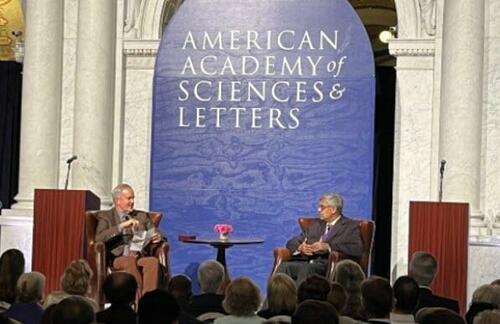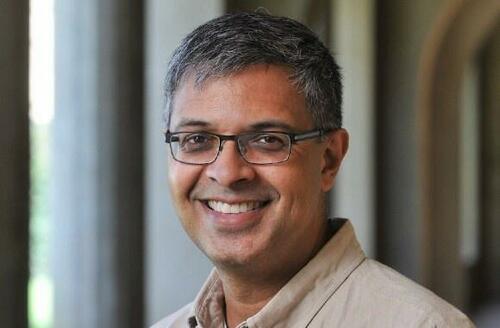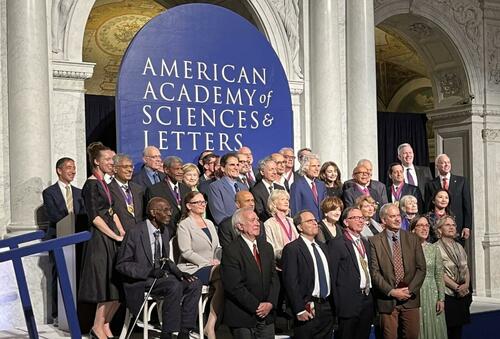Authored by James Samuel via The College Fix,
Dr. Jay Bhattacharya received the American Academy of Sciences and Letters’ top intellectual freedom award on Wednesday for resisting attempts to politically control his scientific work during the COVID-19 pandemic.
The academy presents its annual Robert J. Zimmer Medal for Intellectual Freedom to a scholar “who displays extraordinary courage in the exercise of intellectual freedom,” according to its website.
Bhattacharya, a professor of medicine at Stanford University, received the honor during the academy’s annual investiture ceremony at the Library of Congress in Washington D.C. Afterward, he joined Princeton University Professor Stephen Macedo for an interview on stage.
Macedo began by asking about the first time Bhattacharya pushed back against the government’s handling of the pandemic.
“I wasn’t prepared for it,” Bhattacharya said.
“I had never published an op-ed. I had never been on TV. I was a quiet scholar, and I had this idea regarding the pandemic that the disease was more widespread than people realized,” he said.
Then, after he wrote an op-ed about it, he “got death threats.” Bhattacharya said attacks came from Stanford as well.
“The university, which I loved, … investigated me for false allegations … that they knew were false,” he said.
“I got sent a very clear signal that I needed to stay quiet.”
“I lost sleep, I couldn’t eat,” he said. “But I decided that I didn’t care about my career anymore and I needed to say what I saw."
Dr. Jay Bhattacharya
“These policies that we were following were going to harm a lot of poor people … and there were better policies possible,” Bhattacharya said.
In 2020, he co-authored the Great Barrington Declaration, an open letter to government officials and public health authorities challenging mandatory lockdowns and other decisions about the pandemic.
Bhattacharya said it was “the least original thing” he ever wrote, and Macedo pointed out that his recommendations had “been anticipated in many pandemic plans before COVID.”
Bhattacharya contrasted the government’s COVID-19 response with that of the Hong Kong flu in 1968, joking that “the United States addressed it by having Woodstock.”
“The idea that disrupting normal social life is in itself bad for health, I thought was a commonplace in public health,” he said.
Next, Macedo asked why government leaders across the world adopted oppressive measures similar to China’s to try to “stop the spread of a respiratory virus.”
Bhattacharya responded, “I think it’s complicated, but … the central thing is fear. I think public health authorities were scared of this new disease, and they decided that scaring people was also a good policy.
Modern technology also played a part — “that would have been unthinkable before,” he said.
Macedo pointed out that, at the time, Bhattacharya was viewed as “a dissenter from mainstream policy,” but many others “were sympathetic to [his] view but did not feel able to speak up.”
Bhattacharya replied, “I think people were very, very scared, both about their own physical safety, but also, they’re scared for their own careers,” a fear that he shared.
Bhattacharya also touched on his participation in a lawsuit accusing the Biden administration of secretly telling social media companies to censor speech that ran against its COVID-19 policies.
“In 2022, when Elon Musk bought Twitter, it turns out that I had been placed on a blacklist the day I joined Twitter because I put the Great Barrington Declaration on there,” he said.
“That was not an accident. Twitter didn’t do that on its own. There was a systematic campaign by the federal bureaucracy, including the CDC, the surgeon general’s office,” he said.
“All of these federal agencies essentially pressured Twitter and other social media to silence voices … that were contrary to pandemic policy put forward by the administration,” Bhattacharya said. “The American First Amendment didn’t hold during the pandemic. We did not have free speech.”
The case is pending in a court, and Bhattacharya expressed hope they will win “eventually.”
“The government going to Twitter or to Facebook and saying ‘Silence Jay or silence people like Jay who are saying these kinds of things,’ where I’m not told I’m being silenced, I don’t get to tell the government to go take a hike … that’s a violation of the First Amendment,” he said.
Macedo asked about the increasing “emphasis on paternalism in public health,” and the idea that “the public doesn’t really understand the science, so they need to be guided rather than told the truth.”
Bhattacharya responded: “If I go around and say smoking is good for you … I’ve done something deeply harmful to the public … but the ethical basis for that is that there really is an honest scientific consensus that smoking is terrible for you.”
However, in the case of the COVID-19 pandemic, Bhattacharya said there was no scientific consensus.
“What we needed was everyone speaking up and saying what they saw, so there was no ethical basis for the normal public health angle to say, ‘Look, you just need to fall in line and say what everybody else says,’” Bhattacharya said.
Macedo concluded by asking about a Stanford conference on COVID policy earlier this fall that Bhattacharya organized, and if it signaled “a period of remorse and contrition” for the university.
“I do actually see some reason for optimism,” Bhattacharya said, adding that Stanford’s president did not take sides.
“What he said was, ‘We have an obligation to be the kind of place where these kinds of conversations happen,’” he said. “What we do as universities is provide the platform where people of good faith can come together and talk to each other. That’s what we’ve forgotten about, and that leads to great things.”
Bhattacharya is the second recipient of the academy’s Zimmer Medal.
The inaugural recipient in 2023 was Sir Salman Rushdie, an author who criticized the Quran in his 1988 book “The Satanic Verses,” and has faced several attempts on his life for it. He was chosen for the award for his adversity and “refusal to be silenced,” according to the academy’s website.
On Wednesday, the academy also honored ten professors with Barry Prizes for Distinguished Intellectual Achievement.
The recipients were Akhil Reed Amar and Nicholas Christakis from Yale; Henry Louis Gates, Karin Öberg, and Jeannie Suk Gersen from Harvard; William Chester Jordan from Princeton; Marianne Bertrand from University of Chicago; Brian Conrad from Stanford; Megan Sykes from Columbia; and Gary Anderson from Notre Dame.
2024 American Academy of Sciences and Letters inductees and award winners
The Barry Prize “honors those whose work has made outstanding contributions to humanity’s knowledge, appreciation, and cultivation of the good, the true, and the beautiful,” according to the academy. The winners also received a $50,000 cash prize.
More than 50 new members also were inducted into the academy on Wednesday.
Salvatore Torquato, a professor of natural sciences at Princeton and a new inductee, told The College Fix that organizations with missions like the Academy of Sciences and Letters’ are “sorely needed.”
Along with supporting academic freedom, the academy works to support “intellectual rigor” and “the fundamental and constitutive mission of colleges and universities as truth-seeking, knowledge advancing institutions,” according to its website.
The ceremony included a performance from Howard University’s Gospel Choir.
Authored by James Samuel via The College Fix,
Dr. Jay Bhattacharya received the American Academy of Sciences and Letters’ top intellectual freedom award on Wednesday for resisting attempts to politically control his scientific work during the COVID-19 pandemic.
The academy presents its annual Robert J. Zimmer Medal for Intellectual Freedom to a scholar “who displays extraordinary courage in the exercise of intellectual freedom,” according to its website.
Bhattacharya, a professor of medicine at Stanford University, received the honor during the academy’s annual investiture ceremony at the Library of Congress in Washington D.C. Afterward, he joined Princeton University Professor Stephen Macedo for an interview on stage.
Macedo began by asking about the first time Bhattacharya pushed back against the government’s handling of the pandemic.
“I wasn’t prepared for it,” Bhattacharya said.
“I had never published an op-ed. I had never been on TV. I was a quiet scholar, and I had this idea regarding the pandemic that the disease was more widespread than people realized,” he said.
Then, after he wrote an op-ed about it, he “got death threats.” Bhattacharya said attacks came from Stanford as well.
“The university, which I loved, … investigated me for false allegations … that they knew were false,” he said.
“I got sent a very clear signal that I needed to stay quiet.”
“I lost sleep, I couldn’t eat,” he said. “But I decided that I didn’t care about my career anymore and I needed to say what I saw."
Dr. Jay Bhattacharya
“These policies that we were following were going to harm a lot of poor people … and there were better policies possible,” Bhattacharya said.
In 2020, he co-authored the Great Barrington Declaration, an open letter to government officials and public health authorities challenging mandatory lockdowns and other decisions about the pandemic.
Bhattacharya said it was “the least original thing” he ever wrote, and Macedo pointed out that his recommendations had “been anticipated in many pandemic plans before COVID.”
Bhattacharya contrasted the government’s COVID-19 response with that of the Hong Kong flu in 1968, joking that “the United States addressed it by having Woodstock.”
“The idea that disrupting normal social life is in itself bad for health, I thought was a commonplace in public health,” he said.
Next, Macedo asked why government leaders across the world adopted oppressive measures similar to China’s to try to “stop the spread of a respiratory virus.”
Bhattacharya responded, “I think it’s complicated, but … the central thing is fear. I think public health authorities were scared of this new disease, and they decided that scaring people was also a good policy.
Modern technology also played a part — “that would have been unthinkable before,” he said.
Macedo pointed out that, at the time, Bhattacharya was viewed as “a dissenter from mainstream policy,” but many others “were sympathetic to [his] view but did not feel able to speak up.”
Bhattacharya replied, “I think people were very, very scared, both about their own physical safety, but also, they’re scared for their own careers,” a fear that he shared.
Bhattacharya also touched on his participation in a lawsuit accusing the Biden administration of secretly telling social media companies to censor speech that ran against its COVID-19 policies.
“In 2022, when Elon Musk bought Twitter, it turns out that I had been placed on a blacklist the day I joined Twitter because I put the Great Barrington Declaration on there,” he said.
“That was not an accident. Twitter didn’t do that on its own. There was a systematic campaign by the federal bureaucracy, including the CDC, the surgeon general’s office,” he said.
“All of these federal agencies essentially pressured Twitter and other social media to silence voices … that were contrary to pandemic policy put forward by the administration,” Bhattacharya said. “The American First Amendment didn’t hold during the pandemic. We did not have free speech.”
The case is pending in a court, and Bhattacharya expressed hope they will win “eventually.”
“The government going to Twitter or to Facebook and saying ‘Silence Jay or silence people like Jay who are saying these kinds of things,’ where I’m not told I’m being silenced, I don’t get to tell the government to go take a hike … that’s a violation of the First Amendment,” he said.
Macedo asked about the increasing “emphasis on paternalism in public health,” and the idea that “the public doesn’t really understand the science, so they need to be guided rather than told the truth.”
Bhattacharya responded: “If I go around and say smoking is good for you … I’ve done something deeply harmful to the public … but the ethical basis for that is that there really is an honest scientific consensus that smoking is terrible for you.”
However, in the case of the COVID-19 pandemic, Bhattacharya said there was no scientific consensus.
“What we needed was everyone speaking up and saying what they saw, so there was no ethical basis for the normal public health angle to say, ‘Look, you just need to fall in line and say what everybody else says,’” Bhattacharya said.
Macedo concluded by asking about a Stanford conference on COVID policy earlier this fall that Bhattacharya organized, and if it signaled “a period of remorse and contrition” for the university.
“I do actually see some reason for optimism,” Bhattacharya said, adding that Stanford’s president did not take sides.
“What he said was, ‘We have an obligation to be the kind of place where these kinds of conversations happen,’” he said. “What we do as universities is provide the platform where people of good faith can come together and talk to each other. That’s what we’ve forgotten about, and that leads to great things.”
Bhattacharya is the second recipient of the academy’s Zimmer Medal.
The inaugural recipient in 2023 was Sir Salman Rushdie, an author who criticized the Quran in his 1988 book “The Satanic Verses,” and has faced several attempts on his life for it. He was chosen for the award for his adversity and “refusal to be silenced,” according to the academy’s website.
On Wednesday, the academy also honored ten professors with Barry Prizes for Distinguished Intellectual Achievement.
The recipients were Akhil Reed Amar and Nicholas Christakis from Yale; Henry Louis Gates, Karin Öberg, and Jeannie Suk Gersen from Harvard; William Chester Jordan from Princeton; Marianne Bertrand from University of Chicago; Brian Conrad from Stanford; Megan Sykes from Columbia; and Gary Anderson from Notre Dame.
2024 American Academy of Sciences and Letters inductees and award winners
The Barry Prize “honors those whose work has made outstanding contributions to humanity’s knowledge, appreciation, and cultivation of the good, the true, and the beautiful,” according to the academy. The winners also received a $50,000 cash prize.
More than 50 new members also were inducted into the academy on Wednesday.
Salvatore Torquato, a professor of natural sciences at Princeton and a new inductee, told The College Fix that organizations with missions like the Academy of Sciences and Letters’ are “sorely needed.”
Along with supporting academic freedom, the academy works to support “intellectual rigor” and “the fundamental and constitutive mission of colleges and universities as truth-seeking, knowledge advancing institutions,” according to its website.
The ceremony included a performance from Howard University’s Gospel Choir.



